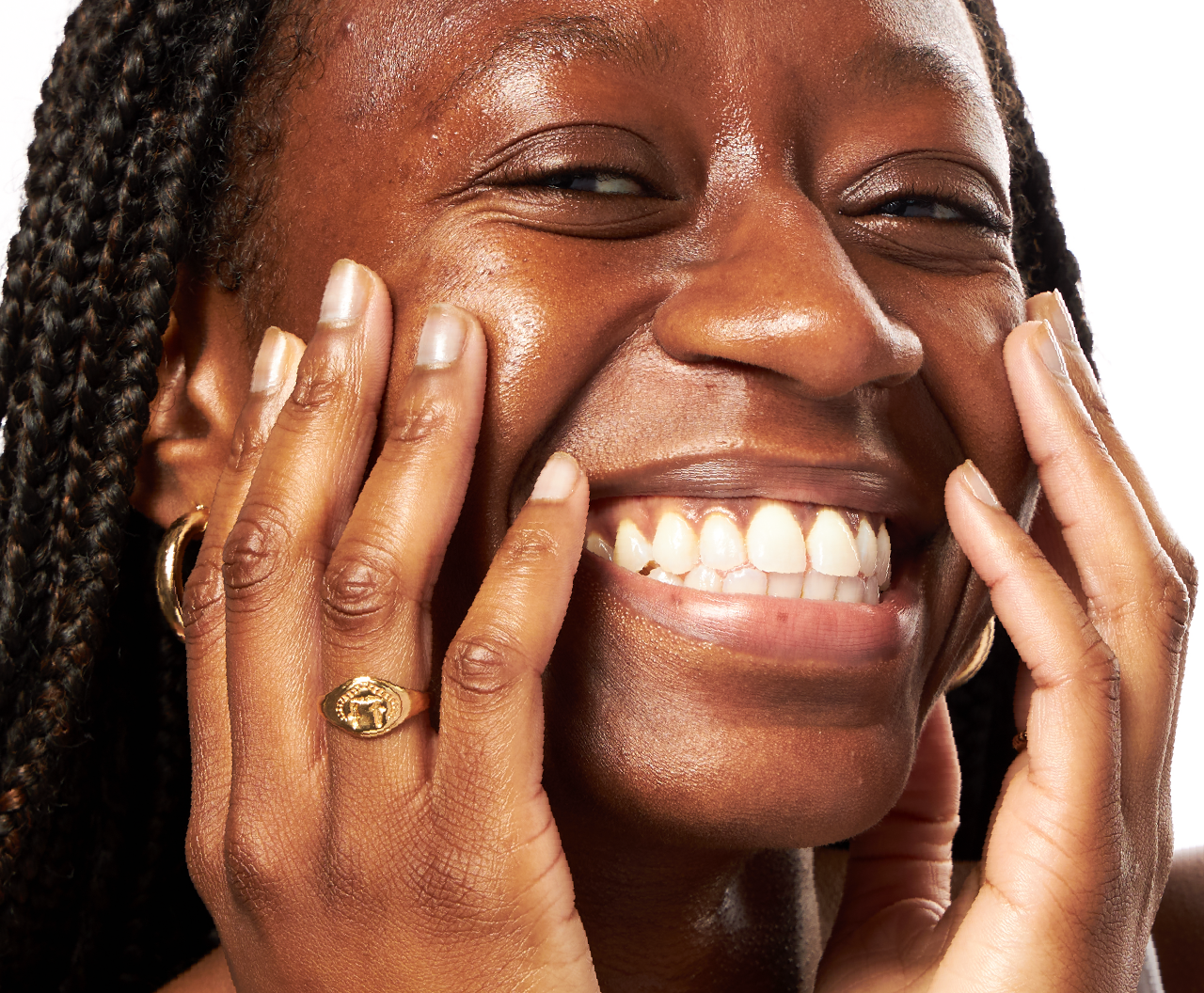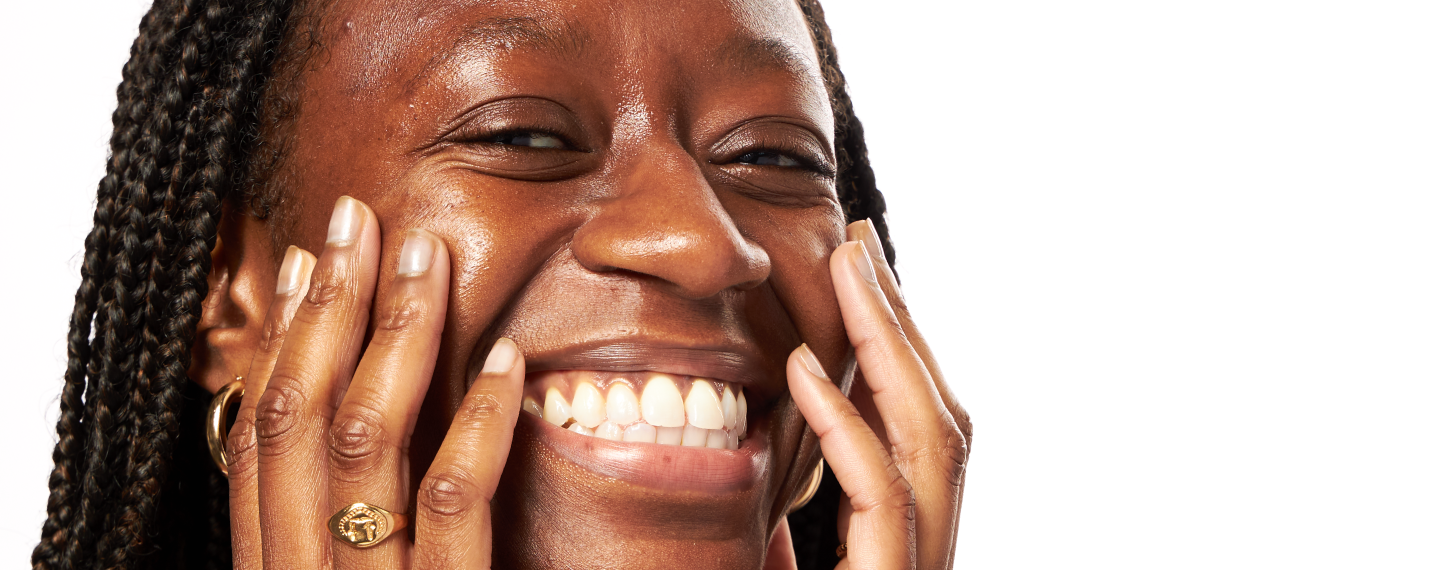Education
What is my acne telling me?


SHARE
Education
What is my acne telling me?
Medically reviewed by Katelyn Hagerty FNP
Written by Apostrophe Team
Last updated 8/1/2024
Whether you deal with a breakout at the same time every month or in the same spot on your face, it can feel like those pimples have a message, and they very well could!
The message your acne is trying to get across may not be apparent by its location or the blemish type, but it’s likely telling you what’s causing the breakouts, which can signal the best route to treatment.
Acne Basics
Acne may very well be the most common dermatological condition, but that doesn’t make it easier to cope with.
In fact, acne struggles can lead to depression and poor self image, let alone the amount of money and time you invest in trying to find the right treatment.
In general, four factors are at play in the development of acne: oil or sebum production, bacteria known as Propionibacterium acnes (or P. acnes, also known as C. acnes), dead skin cells, and inflammation. And many additional factors can influence these four.
There are also several different types of acne lesions. Sure, you know the difference between a black head and what you might call a regular “zit,” but this isn’t the extent of it.
Blackheads, whiteheads, papules, pustules, nodules, and cysts are all different types of pimples or lesions.
Comedones, or blackheads and whiteheads, are considered noninflammatory lesions.
But inflammatory acne is generally considered more severe and more difficult to treat.
What Message Is Your Acne Sending?
Fully understanding the factors that can cause acne, or influence sebum, dead skin cells, bacteria, and inflammation in your skin can help you pinpoint what your acne is trying to tell you.
“Your hormones are fluctuating.”
Your acne could most definitely be telling you that it’s time for your period or that you’re having other hormonal fluctuations.
As many as 85 percent of women report worsening of acne in the days leading up to their periods, an effect appears to increase significantly over the age of 30 according to research.
Other hormonal changes that can lead to acne are menopause, pregnancy, and polycystic ovarian syndrome or PCOS.
“Your cosmetics are making things worse.”
You may use make-up to conceal your acne, but your acne might be trying to tell you that the makeup you’re using is making things worse.
Cosmetics may trigger acne in 62 percent of cases, according to some research. Non-comedogenic makeup and other cosmetics can help reduce the likelihood of acne breakouts.
“This friction is making you breakout.”
Your acne could be a signal that your skin is irritated due to friction.
Known as acne mechanica, some acne is triggered by rubbing against clothing, sports equipment, or even against other skin.
It’s most commonly associated with athletes, but can also arise in soldiers (who carry heavy gear and wear heavy clothing), people with prosthetic limbs, and others.
“Your diet could use changing.”
There is some evidence, albeit not much, that high-glycemic and dairy foods could affect the hormones that trigger acne.
“Stop smoking.”
This one is a clear signal. If you smoke, your acne is giving you one more reason to quit. Women who smoke have a higher incidence of acne.
“Reduce your stress levels.”
Stress is a known predictor and aggravator of acne. It’s believed that stress-related hormones like cortisol trigger increased oil production.
“You’re not getting enough sleep.”
Closely related to stress levels, not getting enough sleep secretes similar hormones that can aggravate acne.
“You need to see a healthcare professional.”
Sometimes, acne can be a sign of an underlying health condition like insulin resistance or endocrine diseases. Pay attention to any other symptoms you might be experiencing and see a doctor if you’re concerned it could be a sign of something bigger.
“Talk to your pharmacist.”
Certain medications can cause or worsen acne, and your pharmacist or doctor may be able to suggest alternatives. Known culprits include benzodiazepines, serotonin reuptake inhibitors, corticosteroids, and some contraceptives.
But What About Face Mapping?
Does that pimple on your forehead mean your liver is failing? Mmm… Probably not.
Face mapping is an ancient Ayurvedic and traditional Chinese medical approach to determining acne causes and treatments.
However, the science supporting these theories is not rooted in modern science and has yet to be proven.
Instead, understanding the factors that cause acne can help you determine the best course of action.
This isn’t to say location doesn’t matter.
If, for example, you wear a medical mask for work or a helmet for your hobby, and your breakouts are centered where those items rest, the location of your pimples is certainly indicative of its cause.
Likewise, if you breakout only where you apply a certain cosmetic.
The Final Word on What Your Acne is Telling You
There are four general things that influence the development of acne: oil production, proliferation of dead skin cells, hormones, and bacteria.
If any one of these factors is influenced by your lack of sleep, diet, menstrual cycle, or disease, for example, it can worsen the acne.
Many of these influencing factors can be managed by you alone, through stress reduction, getting a good night’s sleep, and buying the proper cosmetics, for instance.
But acne treatments exist for a reason, so if your acne is trying to tell you something and you can’t decipher it alone, talk with a doctor or dermatology provider about your treatment options.
References:
https://www.aad.org/public/diseases/acne/really-acne/symptoms
https://www.aad.org/public/diseases/acne/diy/types-breakouts
https://www.forhers.com/blog/face-mapping-101-what-it-is-and-how-to-use-it
https://www.dermatologytimes.com/view/acne-mechanica-caused-skin-skin-friction
Like what you just read? Sign up for our email list to get the scoop on skincare science delivered straight to your inbox.

Deep Dives
A dermatologist shares his thoughts on the recent studies about benzoyl peroxide and benzene.
Read More
Education
What is milia?
What is milia? Today, we’re jumping into one type of bump that you may have heard about most commonly in infants — milia.
Read More
Education
Best moisturizer for acne-prone skin
If you have combination acne-prone skin, figuring out which moisturizer is best for your skin might be tough. In this guide, we break down the best moisturizer for combination, acne-prone skin.
Read More